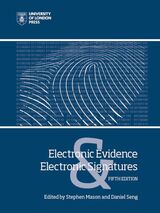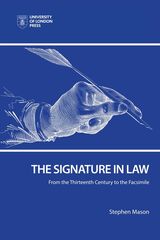6 books about Mason, Stephen

Electronic Evidence
Edited by Stephen Mason and Daniel Seng
University of London Press, 2017
In this updated edition of the well-established practitioner text, Stephen Mason and Daniel Seng have brought together a team of experts in the field to provide an exhaustive treatment of electronic evidence. This fourth edition continues to follow the tradition in English evidence text books by basing the text on the law of England and Wales, with appropriate citations of relevant case law and legislation from other jurisdictions. Stephen Mason (of the Middle Temple, Barrister) is a leading authority on electronic evidence and electronic signatures, having advised global corporations and governments on these topics. He is also the author of Electronic Signatures in Law and editor of International Electronic Evidence, founding the innovative international open access journal Digital Evidence and Electronic Signatures Law Review in 2004. Stephen is an IALS Associate Research Fellow and Visiting Lecturer at the School of Law, University of Tartu, Estonia. Daniel Seng (Associate Professor, National University of Singapore) teaches and researches on information technology law, infocommunications law, evidence and procedure, artificial intelligence, machine learning and legal reasoning. His research interests also include empirical legal studies and quantitative research and data analytics on big data sets. Between 2001 and 2003, he was concurrently the Director of Research, Technology Law Development Group at the Singapore Academy of Law. Daniel is also a special consultant to the World Intellectual Property Organization, where he has researched, delivered papers and published monographs on copyright exceptions for academic institutions, music copyright in the Asia Pacific and the liability of Internet intermediaries. He is also a non-residential fellow with the Centre for Legal Informatics (CodeX), Stanford University. This book is also available online at http://ials.sas.ac.uk/digital/humanities-digital-library/observing-law-ials-open-book-service-law.
[more]

Electronic Evidence
Edited by Stephen Mason and Daniel Seng
University of London Press, 2017
In this updated edition of the well-established practitioner text, Stephen Mason and Daniel Seng have brought together a team of experts in the field to provide an exhaustive treatment of electronic evidence. This fourth edition continues to follow the tradition in English evidence text books by basing the text on the law of England and Wales, with appropriate citations of relevant case law and legislation from other jurisdictions. Stephen Mason (of the Middle Temple, Barrister) is a leading authority on electronic evidence and electronic signatures, having advised global corporations and governments on these topics. He is also the author of Electronic Signatures in Law and editor of International Electronic Evidence, founding the innovative international open access journal Digital Evidence and Electronic Signatures Law Review in 2004. Stephen is an IALS Associate Research Fellow and Visiting Lecturer at the School of Law, University of Tartu, Estonia. Daniel Seng (Associate Professor, National University of Singapore) teaches and researches on information technology law, infocommunications law, evidence and procedure, artificial intelligence, machine learning and legal reasoning. His research interests also include empirical legal studies and quantitative research and data analytics on big data sets. Between 2001 and 2003, he was concurrently the Director of Research, Technology Law Development Group at the Singapore Academy of Law. Daniel is also a special consultant to the World Intellectual Property Organization, where he has researched, delivered papers and published monographs on copyright exceptions for academic institutions, music copyright in the Asia Pacific and the liability of Internet intermediaries. He is also a non-residential fellow with the Centre for Legal Informatics (CodeX), Stanford University. This book is also available online at http://ials.sas.ac.uk/digital/humanities-digital-library/observing-law-ials-open-book-service-law.
[more]

Electronic Evidence and Electronic Signatures
Stephen Mason and Daniel Seng
University of London Press, 2021
Two leading authorities address the technical and ethical issues of practicing law in the digital age.
In this updated edition of a well-established practitioner text, Stephen Mason and Daniel Seng have brought together a team of experts in the field to provide an exhaustive treatment of electronic evidence and electronic signatures. This fifth edition continues to follow the tradition in English evidence textbooks by basing the text on the law of England and Wales, with appropriate citations of relevant case law and legislation from other jurisdictions.
In this updated edition of a well-established practitioner text, Stephen Mason and Daniel Seng have brought together a team of experts in the field to provide an exhaustive treatment of electronic evidence and electronic signatures. This fifth edition continues to follow the tradition in English evidence textbooks by basing the text on the law of England and Wales, with appropriate citations of relevant case law and legislation from other jurisdictions.
[more]

Electronic Signatures in Law
Stephen Mason
University of London Press, 2016
This fourth edition of the well-established practitioner text sets out what constitutes an electronic signature, the form an electronic signature can take, and discusses the issues relating to evidence – illustrated by analysis of relevant case law and legislation from a wide range of common law and civil law jurisdictions. Stephen Mason is a leading authority on electronic signatures and electronic evidence, having advised global corporations and governments on these topics. He is also the editor of Electronic Evidence and International Electronic Evidence, and he founded the international open-source journal Digital Evidence and Electronic Signature Law Review in 2004. This book is also available online at http://ials.sas.ac.uk/digital/humanities-digital-library/observing-law-ials-open-book-service-law.
[more]

Electronic Signatures in Law
Stephen Mason
University of London Press, 2016
This fourth edition of the well-established practitioner text sets out what constitutes an electronic signature, the form an electronic signature can take, and discusses the issues relating to evidence – illustrated by analysis of relevant case law and legislation from a wide range of common law and civil law jurisdictions. Stephen Mason is a leading authority on electronic signatures and electronic evidence, having advised global corporations and governments on these topics. He is also the editor of Electronic Evidence and International Electronic Evidence, and he founded the international open-source journal Digital Evidence and Electronic Signature Law Review in 2004. This book is also available online at http://ials.sas.ac.uk/digital/humanities-digital-library/observing-law-ials-open-book-service-law.
[more]

The Signature in Law
From the Thirteenth Century to the Facsimile
Stephen Mason
University of London Press, 2022
This book considers the judicial development of the signature—its definition, purpose, and legal functions.
Since the thirteenth century, the signature has been used to demonstrate proof of intent. This book puts the concept of the signature into a broad legal context, setting out the purposes and functions of a signature. Drawing on cases from common law jurisdictions across the world, this book demonstrates that judges expanded the meaning of the signature as technologies developed and were used in unanticipated ways.
Following an overview of the historical methods used to demonstrate proof of intent and authentication, the book considers the judicial response to the variations in form that signatures have been subject to over the past two hundred years, from initials, partial signatures, and fingerprints to rubber stamps and typewriting. Past judicial decision-making not only demonstrates the flexibility of the form a signature can take but also confirms that judges had the flexibility of mind to accept the first forms of electronic signature (telex, facsimile transmission) without the aid of special legislation. In this way, the signature is a prime example of the inherent flexibility of the English common law.
Since the thirteenth century, the signature has been used to demonstrate proof of intent. This book puts the concept of the signature into a broad legal context, setting out the purposes and functions of a signature. Drawing on cases from common law jurisdictions across the world, this book demonstrates that judges expanded the meaning of the signature as technologies developed and were used in unanticipated ways.
Following an overview of the historical methods used to demonstrate proof of intent and authentication, the book considers the judicial response to the variations in form that signatures have been subject to over the past two hundred years, from initials, partial signatures, and fingerprints to rubber stamps and typewriting. Past judicial decision-making not only demonstrates the flexibility of the form a signature can take but also confirms that judges had the flexibility of mind to accept the first forms of electronic signature (telex, facsimile transmission) without the aid of special legislation. In this way, the signature is a prime example of the inherent flexibility of the English common law.
[more]
READERS
Browse our collection.
PUBLISHERS
See BiblioVault's publisher services.
STUDENT SERVICES
Files for college accessibility offices.
UChicago Accessibility Resources
home | accessibility | search | about | contact us
BiblioVault ® 2001 - 2024
The University of Chicago Press









